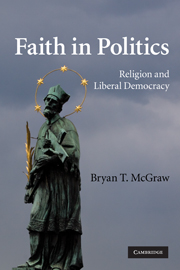Book contents
- Frontmatter
- Contents
- Acknowledgements
- Introduction
- 1 Europe's religious parties and the liberal consensus
- 2 The argument for deliberative restraint
- 3 The problem with secular reasons
- 4 Public reason and religious conflict
- 5 Religion and the problem of political autonomy
- 6 Making the most of conflict: religion and political toleration
- Conclusion: toward a better sort of liberal democracy
- Bibliography
- Index
Introduction
Published online by Cambridge University Press: 05 June 2012
- Frontmatter
- Contents
- Acknowledgements
- Introduction
- 1 Europe's religious parties and the liberal consensus
- 2 The argument for deliberative restraint
- 3 The problem with secular reasons
- 4 Public reason and religious conflict
- 5 Religion and the problem of political autonomy
- 6 Making the most of conflict: religion and political toleration
- Conclusion: toward a better sort of liberal democracy
- Bibliography
- Index
Summary
The liberal democratic tradition of political thought has long made religion an important, even central, subject of study and debate. Constructed in part as a means of avoiding the sorts of destructive religious wars that plagued post-Reformation Europe, liberalism has both relied on religious ideals to buttress its claims about human freedom and equality, and treated it as a threatening force, ready to upend political peace for the demands of faith. Among contemporary theorists, recourse to supportive religious doctrines has largely dissipated while the view of religion as incipient threat remains and has even intensified – and perhaps with good reason. Religion may not be alone as a cause, but the deadly conflicts in the Middle East, the former Yugoslavia, Nigeria, and the Indian subcontinent, to take a few examples, are all profoundly tied up with religion. Closer to home, the most contentious issues in American politics – abortion, euthanasia, homosexuality, and so on – all have important religious connections, and liberals and politically organized religious believers almost always seem to find themselves opposed to one another. As Jeff Spinner-Halev has noted, “The religious conservative haunts liberalism today.”
In this context liberal political theorists have coalesced around a rough consensus regarding the dangers posed by religion and their possible remedies. Liberals are, of course, often accused of falling decisively short of consensus on pretty much everything, but there is little exaggeration in saying that most liberal thinkers have concluded that constitutional democracies, especially under the kinds of wide moral and religious pluralism evident in modern societies, are made more legitimate, stable, and free when religion is largely excluded from and reshaped to be made more compatible with a just political order.
- Type
- Chapter
- Information
- Faith in PoliticsReligion and Liberal Democracy, pp. 1 - 32Publisher: Cambridge University PressPrint publication year: 2010

